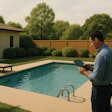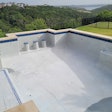
In mid-March, new provisions of the Americans with Disabilities Act regarding public pools and spas become law. Simply put, all public pools must be equipped with handicapped-accessible pool lifts by then or possibly face fines levied by the U.S. Department of Justice or lawsuits filed by individuals or advocacy groups.
Given the huge number of pools that need to be brought into compliance and the finite number of manufactured units and available installers, what's going to happen on March 16?
To find out, we asked John Caden, who founded pool lift maker RehaMed in 1996 and now works for S.R. Smith, as an accessibility specialist. We wanted to know how many pools were not in compliance, what those facilities would need to do to avoid fines and litigation, and exactly who would be enforcing the law.
AQUA: What is the level of awareness about the new requirements among facility operators?
John Caden: It should be pretty high, especially with respect to swimming pools, because the regulations have actually been on paper since 2003. They were originally published in September of that year as "guidelines," and the document is called "The Americans With Disabilities Act Accessibility Guidelines," commonly referred to as ADAAG 2004. These were originally published so that any new construction projects or facilities undergoing major modifications would be able to build to those standards, with the anticipation that eventually they'd become the law.
So it's been around a while. Probably the industry that's been slowest to react has been the hospitality industry. But I really can't say lack of awareness has been the issue. I think it's been more a case of that industry thinking they could make it go away, to be quite honest with you. In 2008, the Department of Justice put out what they call a Notice of Proposed Rulemaking, where they basically laid out all of the things they were intending to do to enable the public to comment on it. During the hearings that ensued after that people in the hospitality industry were trying to make the claim that they couldn't afford it, that they don't have that many disabled customers, that the dog ate their homework, you know, one thing after another on reasons why they shouldn't have to comply with the regulations. Obviously they were pretty much ignored.
So it's been out there, it's certainly been on the radar. Plus the aquatics industry — the pool professionals that service pools and sell pools and take care of all the equipment — have also been out there since probably 2010 when the law was passed, telling people about it. Obviously for them it's an opportunity to sell equipment for accessibility and expand the scope of what their job is. So the initiative on their part has also created a lot of awareness about the regulations.
I spoke with an installer in South Carolina recently who suggested there would be an organized resistance to the law by people in the hospitality industry. But from what you're saying, they had their chance and it's a done deal.
Caden: Keep in mind that this law was passed in 1990, and any hospitality industry facility is already complying with the ADA. They have accessible hotel rooms, they have accessible parking spaces, and their facilities are accessible. These are all things that have been out there. All that's happening now is they are expanding the scope of the regulations a little bit to enable people with disabilities to use all the facilities when they come to a hotel. It doesn't make a whole lot of sense to offer accessible rooms if a disabled person can't use your swimming pool. So, it's not going to go away. They can have their organized resistance and do whatever they want, but like I said this is a law that really kind of got its genesis back in the mid-'60s as part of all the anti-discrimination legislation that was enacted back then to create equal opportunity on the basis of race and gender. The challenge with creating equal opportunity for someone that's disabled rests on the fact that much of the discrimination is in the form of architectural barriers that prevent a person from actually getting into a place so they can even be discriminated against.
It's not going to go away.
AQUA: You've been at the forefront of efforts to educate the industry about these changes. Can you explain the importance of that?
Caden: First of all, the main thing we're trying to do is get accurate information out and dispel a lot of the rumors and myths and misunderstandings so people have a clearer idea of what their responsibilities are and are not under the regulations. There are some people going around telling every swimming pool they have to be accessible by March 15 or they're going to get fined $50,000. Well, that's just not true. The main thing is to get all the information out there and to get it out correctly.
Secondarily I've been a disability rights advocate for quite a while; my background is more healthcare than it is swimming pools. But I got into the swimming pool business because we made a swimming pool lift, which we sold to the swimming pool industry. So, we always try to associate our product with a little bit of expertise, not just on the product itself but also on the industry. I feel that's the responsibility of any manufacturer — to make sure their customers and potential customers have the correct information in front of them so they can make a good choice on the products they want to buy.
AQUA: What are some of the things you've been doing to educate the industry?
Caden: First of all, S.R. Smith has put together a website that's separate from the commercial site that's specifically set up to be a repository for anything we can find having to do with swimming pool accessibility, the ADA law, and anything that fits under that umbrella, and that's www.poollifts.com. We have a whole series of white papers that I've written to try to provide more detail on some of the issues that might be a little confusing in the law. It's got links to all the different websites that might have something to do with swimming pool accessibility. Any time a news item pops up on the internet we flip that around and put it on our website so people can keep up to date on what's being said out there about swimming pool accessibility. And then, if all else fails, we have an "Ask And Expert" email link, so if you can't find an answer to a question, we'll try to find it for you.
Secondly I've been speaking at a lot of seminars and trade shows and different types of industry events teaching people about the law and implementation of it — what can a pool professional do to help their customers prepare for the ADA. I just gave one in Atlantic City and at the Orlando Show.
I did a series of three webinars for the APSP that are available on their website. These are accredited, and someone that takes it can get a CEU credit. Again, that just goes through the same sequence of the law itself, implementing the law, and an FAQ. So we're trying to get as much out there as we can.
AQUA: So the awareness is pretty high. How about the level of compliance?
Caden: A lot of that depends on the facility. If it's a new facility that's just being built or if it's one that was started after March 15, 2011, or is undergoing major modifications, those types of facilities have to fully comply with the ADA requirements. So March 15 of 2012, if they're open, they've got to fully comply with the ADA.
For existing facilities, the rules are a little bit different. If there's an existing facility, they have to comply to the extent that compliance is readily achievable. And "readily achievable" means being able to be accomplished without much difficulty or expense. So what any existing facility should do, and this is what we counsel people to do, is between now and March 15 to go through their facility and conduct what we call a "barrier-removal analysis." That basically means to assess the facility to determine what their obligations are. They need to identify the pools that they have, whether these pools fall under ADA jurisdiction, and determine if it's readily achievable to make the barrier removal, and if so what are your plans for doing that. Does it mean that you have to have a pool lift in place on March 15? The answer is "no." What you have to have on March 15 is a plan. And if the plan is, "We don't have enough money in our 2012 budget to buy a pool lift, but we will put it in the budget for 2013, that will pretty well work. You just need to have all that information documented, because even though they don't necessarily have to have a compliant installation on March 15, it doesn't prevent them from being sued on March 16. But if they have a plan when somebody shows up to sue them, that's going to mitigate any kind of punitive action. That's pretty much it.
The other thing is, you guys are up in Wisconsin and you probably have a lot of pools that don't even open until June. So why would a pool that doesn't open until June have to have a pool lift in place on March 15? So the key thing we try to stress to everybody is whatever you do, have a plan in place, have it in writing, keep it on file in your facility, so if anybody does ever lodge a complaint you can just reach in your desk drawer, pull out your plan, hand it to them and say, "This is our program." Then at that point let them challenge it.
AQUA: Do you need to file these plans with the Department of Justice?
Caden: You don't clear it or file it with anybody. You just write it yourself. You see, the ADA is what's called a complaint-driven statute. The only way it gets enforced is if somebody files a complaint. Somebody can file a complaint with the DOJ, or a private individual can sue a facility for not being in compliance. So if an individual files a complaint with the DOJ and for some crazy reason the DOJ actually contacts the facility, all the guy at the facility has to do is say, "Let me email you a copy of my implementation plan, and that's probably the last they'll hear from the DOJ, assuming they have a reasonable implementation plan. If the implementation plan says, "We're going to save $10 a year for the next 50 years to buy a pool lift," they're probably not going to accept it. If it's a reasonable plan like I mentioned above: "We don't have it in the budget this year, but we'll put it in the next budget," that's a little more reasonable.
AQUA: Say everyone is working at peak efficiency. Is there even enough time to get all the lifts installed?
Caden: There's no way. You can estimate how many pools were not in compliance last year. I don't know where we stand exactly, but at the beginning of this process there were probably close to 100,000 pools that needed to become compliant. So if you just do the math and you look at the production capacity of our company and the other companies that we compete with, you're probably looking at a maximum of 15,000 lifts a year that can be built. So it's going to be a process before all these things can be accommodated. So, if a facility is not in compliance and they put a plan together and order a pool lift, then let's say there's a six-month backlog, that could all be written into the implementation plan.
AQUA: What have you heard about enforcement?
Caden: Only the Department of Justice has the authority to enforce the ADA. Now, having said that, there are a lot of state building codes that have adopted the ADA standard as part of the building code. So depending on the state and what the requirements are, states could get involved, especially with new construction and major modifications — instances where the facilities are going to have to pull a permit and get a certificate of occupancy at the end. So states can withhold those if the facilities are not in compliance with the state building codes. So while states don't have the authority to go out and enforce the ADA per se, they can enforce it through enforcing their local building codes.
Now the other thing that happens is some states issue an annual operating permit. And as part of that they may require that the existing pools have to be in compliance with the state building codes, and if they're not they don't get their annual operating permit.
So those are a couple of different ways it can get enforced, but the primary way will be through a complaint filed with the DOJ or having a person come in as an individual and suing the facility for not being in compliance. That's going to be the most predominant way because there are a lot of people out there that are "professional plaintiffs," and they basically go around looking for violations.
AQUA: What was the industry's involvement in coming up with the regulations and deadlines? And do you feel the industry's concerns were addressed?
Caden: Absolutely. At the time this was all happening I was on the board of directors at the APSP. So after the Notice of Proposed Rulemaking, I went to Washington and testified, because there were a couple of things the department of justice was attempting to do that deviated from the original act. They essentially were going to weaken the ADA with respect to swimming pools, so I went up and testified on that. I wasn't the only one, but there were enough people that commented and made noise about what the DOJ was proposing to do that they threw that all out and pretty much stayed with the original guidelines from 2004.
But today the industry is getting even more involved. Like I said, the APSP is out there trying to educate their members and the rest of the industry on what the requirements are for ADA. There are some issues that have been coming up, and we're trying to get a meeting with the Department of Justice, because there are a couple of areas in the law that are a little unclear, and we're trying to get clarification on those to help the industry out a little bit. So it's an ongoing process.
AQUA: Any final thoughts?
Caden: We're trying to advise everyone in the industry to be proactive. Even if you can't afford a pool lift today, or to make your pool accessible, or you're going to order one and it's a one year wait for delivery, just get that done, get it in writing and keep it on file. Because, again, those professional plaintiffs are going to be out on the street on March 16, and this is kind of a stimulus package for them. These are the guys that have been going around for years to the hotels and restaurants and clubs and any type of commercial facility measuring the slope of ramps, the width of doorways, and now they're going to be doing the same thing with swimming pools.
People with disabilities travel. And now when they check into a hotel with an accessible room, they're going to be looking for an accessible swimming pool. And that hotel owner better have one, or he'd better have a plan in place on how he intends to provide one.
We always tell people common sense comes into play with most things, and with the ADA it's no exception. People are hearing rumors, or having people threaten them by saying you're going to have to pay $50,000 if you don't have a pool lift on March15. Just do a little homework. Use industry resources: call the toll-free technical assistance line at the Department of Justice, go to the APSP's website, which has a wealth of information; or you could go to the poollifts.com site at S.R. Smith. It's not really complicated, and the regulations are pretty cut and dried. There are just a couple of little gray areas. The main thing is is to know what your responsibilities are and prepare for them. Obviously the easiest thing to do is to go out and make your pool accessible, but if you can't, the next thing to do is to put a plan together. I can't stress that last point enough.
Comments or thoughts on this article? Please e-mail [email protected].











































